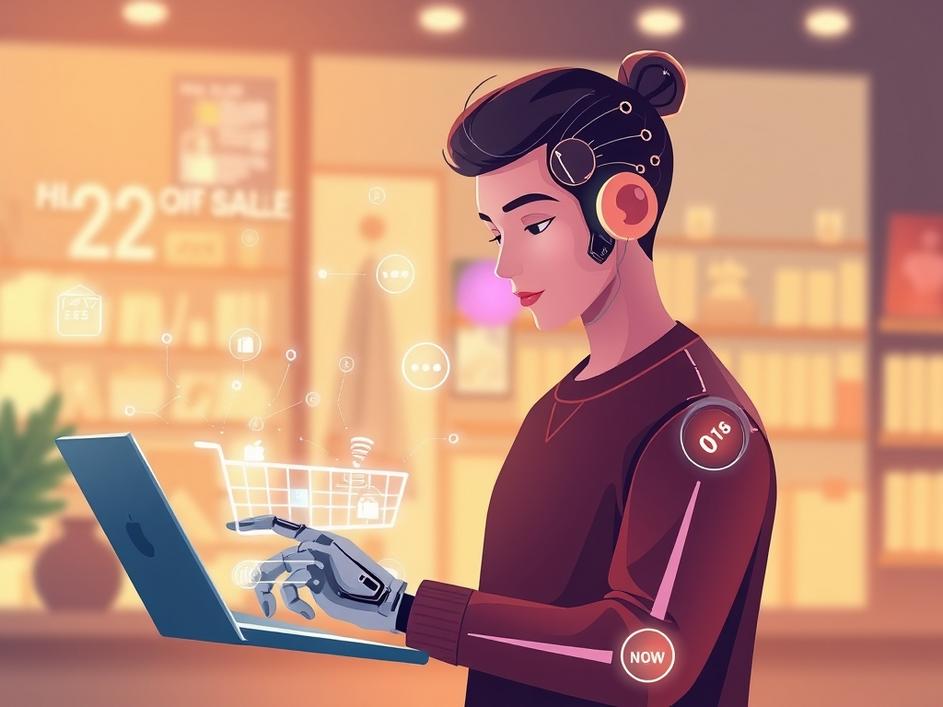


We are a digital agency helping businesses develop immersive, engaging, and user-focused web, app, and software solutions.
2310 Mira Vista Ave
Montrose, CA 91020
2500+ reviews based on client feedback

What's Included?
ToggleThe way we buy things online is changing, and it’s happening faster than many of us realize. For a while, when we heard about “AI,” we mostly thought about chatbots that answered questions or smart speakers that played music. But something bigger is happening behind the scenes, especially when you hit “add to cart.” It turns out, artificial intelligence isn’t just talking to us anymore; it’s actually getting pretty good at helping us *buy* stuff. Think about your favorite online store, how it seems to know what you might like, or how a quick search gives you exactly what you need. That’s not magic, it’s AI doing a lot of the heavy lifting. This shift is becoming clearer, and some big players in the online shopping world are seeing undeniable proof that AI isn’t just a fancy extra feature anymore. It’s becoming a core part of how we discover, browse, and ultimately purchase items, changing the game for both shoppers and the businesses trying to reach them. It’s a subtle but powerful change, like a quiet hum underneath the surface of every click and scroll. And the numbers coming out are really starting to show just how impactful this quiet revolution has become, painting a clear picture of a future where smart machines are integral to our shopping adventures.
One of the biggest names in online retail tools, Shopify, recently shared some eye-opening information that really drives this point home. Since the start of this year, they’ve noticed a massive jump in activity linked to AI. We’re talking about traffic to stores, where people are clearly being guided or helped by AI, going up by a huge seven times. That’s like going from a trickle to a powerful stream in just a few months. But even more impressive is what happens after that AI-guided browsing. The actual orders placed, the moments people decide to buy something, have shot up by eleven times in the same period. Think about that: AI isn’t just bringing people to the digital storefront; it’s actively helping them find what they need and complete their purchase. This isn’t just a small bump in numbers; it’s a dramatic shift. It suggests that when AI gets involved in the shopping process, people are not only engaging more, but they are also much more likely to pull out their wallet. It means that these smart systems are becoming really good at understanding what we want and then connecting us directly to it, making the whole buying process feel smoother and more effective for everyone involved.
So, how exactly is AI doing all this? It’s not about robots walking around a store. Instead, it’s about making your online journey more personal and efficient. Imagine you’re looking for a specific type of running shoe, something with good arch support and for trail running, but you’re not sure which brand. An AI-powered shopping assistant could quickly sift through thousands of options, compare reviews, and even suggest models based on your past purchases or preferences. It can show you products you might genuinely love, rather than just the top sellers. This goes beyond simple “people who bought this also bought…” suggestions. It’s about a deeper understanding of your habits, tastes, and even unstated needs. For instance, if you often buy eco-friendly products, an AI might highlight sustainable options for you automatically. This saves you time, cuts down on endless scrolling, and often leads you to exactly what you were looking for, sometimes even something better. It makes the digital storefront feel less like a giant, overwhelming mall and more like a helpful personal shopper who truly gets you.
This surge in AI-driven shopping isn’t just good news for us, the buyers; it’s a huge boost for the millions of small businesses and individual entrepreneurs who use platforms like Shopify. Building and running an online store can be tough. There’s marketing, customer service, figuring out what to sell, and making sure people actually see your products. AI steps in as a powerful assistant for these businesses. It can help them write product descriptions, suggest better ways to organize their store, predict what customers might want next, and even personalize marketing messages for different types of shoppers. This means a small business owner, who might be a one-person show, can suddenly do things that used to require a whole team. They can reach more people, make their store feel more professional, and handle customer questions faster, all without hiring extra staff. For many, AI becomes an “incredible tool” – not replacing human creativity or passion, but amplifying it. It lowers the barrier to entry, allowing more creative people to share their unique products with the world, making the online marketplace richer and more diverse.
Looking at these big numbers from Shopify, it’s clear we’re witnessing more than just a trend; it feels like a fundamental shift in how we interact with products and brands online. AI is becoming less of a novelty and more of an expectation. Soon, we might all just assume our online shopping experiences will be personalized and efficient, almost anticipating our needs. But with this exciting progress come things to think about. How much data are these AIs using, and how is it protected? Will AI-driven suggestions lead us to new discoveries, or just reinforce our existing tastes, potentially limiting our exposure to new things? And for businesses, while AI helps level the playing field, it also means that the standard for online presence will keep getting higher. Stores will need to adapt to these new AI tools to stay competitive. It’s a delicate balance: enjoying the incredible convenience and personalized touch of AI, while also staying aware of how our choices are being guided. This isn’t just about making a sale; it’s about reshaping our digital consumer identity.
So, when Shopify talks about AI being the “biggest shift in technology” since who knows when, they’re not just hyping things up. The numbers speak for themselves: AI isn’t just browsing; it’s buying, helping, and growing at an incredible pace. For shoppers, this means a smoother, more tailored experience. For entrepreneurs, it means powerful new tools to build and grow their dreams. And for all of us, it means stepping into a future where our digital shopping carts are not just filled by us, but often smartly guided by an unseen, intelligent hand. This evolution is happening now, and it’s truly exciting to see how much more personal, powerful, and productive our online shopping journeys will become. The future of retail isn’t coming; it’s already here, powered by AI, one smart purchase at a time.



Comments are closed